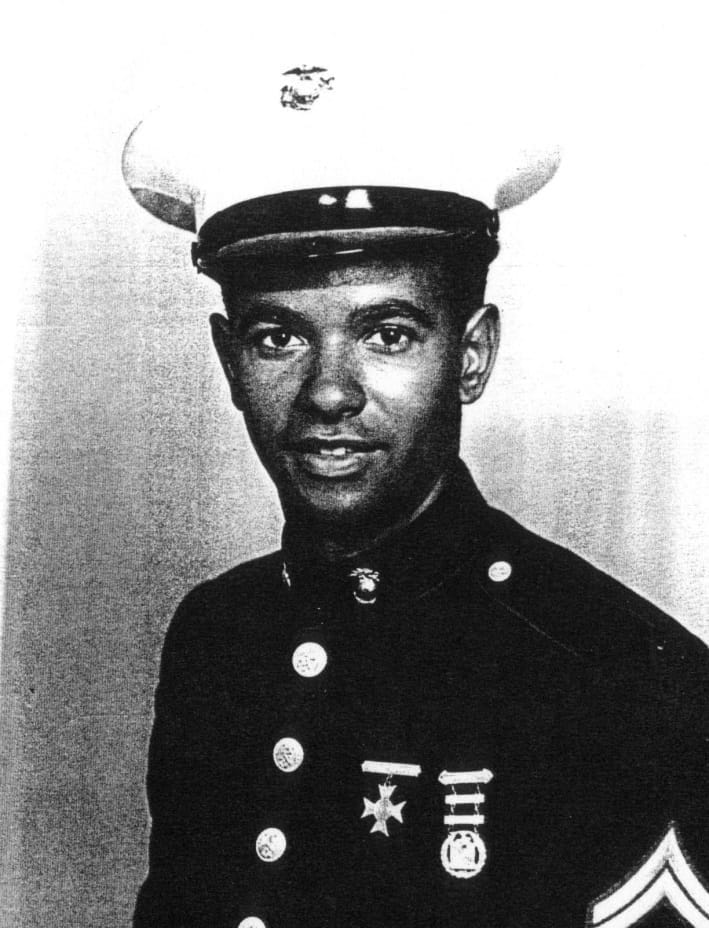Local Legends: The Montford Marine
While Marine Wilbur K. Lewis never saw combat on the front lines abroad, he battled discrimination at home.

250 years ago, on Nov. 10, 1775, the United States Marine Corps was famously born in a bar – Tun Tavern in Philadelphia – for service in the War of Independence. However, it wouldn’t be until Aug. 26, 1942 that the first Black marine recruits reported for training at Montford Point in Jacksonville, North Carolina. By the end of World War II, Montford Point had turned out 20,000 Black marines, including Oxford’s Wilbur Kindle Lewis.
Lewis was born in Oxford on Jan. 10, 1924, the son of Marion Mark and Margaret (Bedenbaugh) Lewis. He was the family’s youngest child and one of five along with siblings Marvin Lewis, Francis Lewis, Ernestine C. (Lewis) Russell and Myla Elaine Lewis.
By 1930, his parents had divorced, and all five children were living with his mother and stepfather, John E. Ross. Lewis went through Oxford’s public schools and graduated from Stewart High School with the Class of 1942. Sandwiching Lewis’ graduation was a pair of family tragedies, when Myla died of pneumonia in 1941 and Marvin died of tuberculosis in 1943.
Immediately upon graduation, Lewis headed to Cincinnati and attempted to enlist in the Marine Corps, but was informed by the recruiter that he was barred from enlisting due to his skin color. Almost immediately after his enlistment attempt, President Franklin Delano Roosevelt’s Executive Order 8802 changed this policy, legally paving the way for the Montford Point marines.
However, Lewis had by that time enrolled at Miami University and began classes in the fall of 1942. Still feeling the call to serve, he returned and enlisted in the Marines in December 1942, though he was not given orders to report until Jan. 9 the following year.
In an oral history conducted by the Smith Library of Regional History in 2001, Lewis stated that he chose the Marine Corps because he had known that if he would have joined the Army or Navy, he would have been relegated to being a cook or truck driver in a non-combat role. In the same interview, he also recounted how his journey to Montford Point nearly proved to be fatal.
Having been born and raised in the North, Lewis recalled that he was unaccustomed to segregation and was required to sit in a specific train car. When he had to transfer from the train to a bus, the white bus driver at first refused to allow him to board, resulting in a physical altercation between Lewis and the bus driver. This escalated when a group of white locals held Lewis down and sent for a rope with intention of lynching him. It was only after they found out that he was “government property,” as Lewis put it, that they backed off and allowed him to board the bus.
The discrimination did not subside when Lewis reached Montford Point where his training cadre and officers did not believe that Black marines should be allowed to serve, despite the fact that they had a much higher percentage of college experience than their white counterparts. While the content and standards of their training was officially the exact same as the rest of the Corps, the Black recruits were given constant punitive training aimed at drumming them out of the Marines. However, what Lewis remembered was a strengthening of the Montford Point marines’ determination not to quit.
Completing boot camp, his unit continued on to advanced training, forming the 51st Composite Defense Battalion. Lewis was assigned to the 21st Platoon of the unit and trained in the use of defensive weapons, namely small arms, anti-aircraft guns and pack howitzers.
Completing additional specialized communications training, Lewis became a radio-telephone operator. This job included the use of code machines, and he was granted a top secret level clearance following an investigation of his background carried out by the Federal Bureau of Investigation (FBI).
Receiving a furlough to return home before deploying overseas, Lewis also met discrimination closer to home. While passing through Middletown, he was stopped by a police officer and detained when the officer took exception to him wearing a Marine Corps uniform. This would be repeated while back in Oxford when he was stopped for the same reason by the U.S. Navy shore patrol stationed in town to police the sailors receiving training at Miami University.
The Montford Point units underwent reorganization and after being assigned to the base’s headquarters and service company for a brief period, Lewis left for San Francisco with the 52nd Defense Battalion to join the Fleet Marine Force operating in the Pacific. By this time, the unit had transitioned to be an anti-aircraft outfit, primarily operating 90mm AA guns.
They shipped out for Pearl Harbor in October 1944 where they witnessed the destruction still being cleaned up from the attack three years earlier. After three days aboard ship in Pearl Harbor, they headed to the Marshall Islands and where they set up air defense positions.
In March 1945, the battalion was ordered to Guam, where it remained while mop-up operations were underway following the battle. In November 1945, Lewis was among a detachment from the unit sent to Eniwetok.
Although never given the opportunity to see combat on the front lines, the Black marines did their job standing ready to protect Allied forces from the threat of Japanese air attack. They returned to the United States in early 1946 with Lewis being discharged as a corporal on March 23, 1946.
Coming back to Oxford as a veteran, Lewis returned to Miami but initially struggled to focus on his education. He traveled to Cleveland where he worked at a Standard Oil service station, and around the same time married Catherine Isabel (Cheeks) Lewis. Together they raised six children, Myla Katherine (Lewis) Collins, Debra Anne Lewis, Gail Lewis-Miller, Mark Lewis, Ken Lewis, Ron Lewis.
Returning to Oxford, Lewis worked for Follett’s bookstore while he and Isabel both completed undergraduate degrees at Miami. With Lewis unable to find a teaching position, he took his family to Minnesota to work at another Follett bookstore while continuing to search for a teaching position.
Finally finding a professional position, Lewis became a teacher with Minneapolis public schools, earned a masters in school administration from University of Minnesota, and later served as a school administrator. In this later role, he used his communications training from the Marines Corps to set up a districtwide electronics program.
He took an early retirement in 1981, and after Isabel’s 1985 retirement from being the director of food services for the Bloomington, Minnesota school district, the couple moved to Arizona in 1989.
Lewis was for many years a member of the Montford Point Marine Association, a veterans service organization working to preserve the history of the earliest Black marines, improve social conditions of veterans and support senior citizen veterans. In accordance with legislation signed by President Barack Obama the previous year, He and his fellow Montford Point Marines were awarded the Congressional Gold Medal on June 27, 2012.
Wilbur died on the 241st birthday of the Marine Corps, Nov. 10, 2016. He was interred with Isabel, who had passed on May 1, 2011, in the Desert Garden United Church Columbarium in Maricopa County, Arizona. His obituary summarized his life, “Wilbur led his life by example, with conviction, determination and dignity. His range and depth of knowledge were unsurpassed. Devotion to family was paramount.”
Brad Spurlock is the manager of the Smith Library of Regional History and Cummins Local History Room, Lane Libraries. A certified archivist, Brad has over a decade of experience working with local history, maintaining archival collections and collaborating on community history projects. He also serves as a board member for Historic Hamilton Inc. and the Butler County Historical Society.




